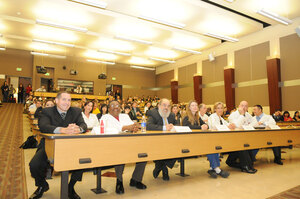Back from Haiti, doctors recount their experiences
The 10 emergency and trauma medical experts from the USC Keck School of Medicine who flew to Haiti to assist in the relief efforts after the devastating earthquake detailed their experiences at an event Wednesday night.

Helping hands · The surgeons and medical experts who provided medical relief to victims of the earthquake in Haiti spoke to an audience at Keck on Wednesday. - Gary Fung | Daily Trojan
The event showcased the medical relief efforts the Los Angeles County + USC Medical Center team undertook in photo slideshows and a video presentation.
Team leader Dr. Ramon Cestero and team member Dr. Henri Ford shared their stories to an audience of approximately 140 colleagues, students and friends.
“I’m so proud of the contributions our team made to the care of the Haitian people,” Ford said. “The level of expertise that we brought to the table is simply unparalleled. We have well-trained, outstanding people in one of the best trauma facilities, who happened to come to take care of injured Haitian children and adults. Those who benefited from their care, I would have to say, were really blessed.”
The team worked at the Israeli Military Field Hospital, a professional facility where they helped deliver seven infants, Cestero said.
The surgeons performed a number of amputations to save Haitians who otherwise might have died from their injuries. They worked night hours to keep the facility open from 7 p.m. to 7 a.m., when the doctors and medical assistants performed triage and administered anesthesia and maintained the clinic.
“As far as the medical equipment, we were just bringing our expertise,” said Cestero, a Keck fellow and trauma surgeon at LAC + USC Medical Center, commenting on the self-sufficiency of the USC team.
Ford, a native Haitian and the Keck School’s vice dean of medical education, said that, in spite of the situation in Haiti, he has faith the country will recover.
“Despite the devastation, the misery and the suffering, I maintain an optimistic outlook for the future of Haiti because I believe that hope, faith, determination are the fundamental underpinnings of the Haitian people,” Ford said. “For those reasons, I know that they will rise from the ashes and, with the help of the international community and especially the Trojan family, we will build a new, stronger, better Haiti.”
The humanitarian efforts hit home for Ford, whose sister and brother-in-law were in Haiti when the tragic earthquake struck.
“It’s really hard to quantify, but, when I start looking at the journey that I went through since Jan. 12, I can only say that, somehow for the entire 51 years I have been on this earth, I was being prepared to intervene for a moment such as this one,” he said.
Ford helped mobilize the entire surgical community to respond to the tragedy in Haiti and used his expertise in pediatric trauma to provide much-needed surgical care in his native country.
The surgeon also said he was grateful for all of the volunteer contributions in the face of devastation and suffering in Haiti and saw a visible difference from every helping hand.
“The needs are so vast and will be long-lasting,” Ford said. “The opportunity to give will always be welcomed. Haiti is going to need money for a long time so donations are always going to be encouraged. Give a lot, give often. Beyond that, we need intellectual capital. We need people with skills of a broad range to actually go down there and help in the rebuilding process.”
Ford said he hopes the main USC campus will join the efforts already undertaken by the medical school.
“Looking at the Trojan family, I think we have a tremendous opportunity to play a pivotal role in rebuilding the new Haiti,” he said. “From the standpoint of the Keck School, we can play a major role in helping to rebuild the school of medicine that’s completely destroyed. We can help with the curriculum. We can really bring the talent that we have to help improve whatever they had before. We have a school of engineering, we have the school of planning and policy and so many others that can actually go right now and begin to contribute to the rebuilding process.”
Keck Dean Carmen Puliafito will be convening a council of the deans from various USC schools to bring resources together to help rebuild Haiti, Ford said.
The native Haitian plans to return in the near future to help rebuild the community where he grew up.
“Just seeing the look on peoples faces when I told them that I had to go back. The look of disappointment told me that I was abandoning them,” he said. “There’s no way that I could stay away indefinitely. Many of them saw me as a beacon of hope, as a strong advocate, and I have to continue to fulfill that role. I have to step forward and that’s why I need to spread the word here and also why I need to go back there.”
